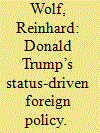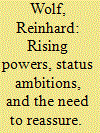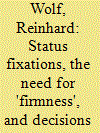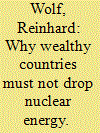| Srl | Item |
| 1 |
ID:
156958


|
|
|
|
|
| Summary/Abstract |
Ever since Donald Trump won the US presidential election, governments and pundits all over the world have been agonising about the direction American foreign policy will take under his watch. Is he a traditional ‘America First’ isolationist who fears ‘entangling alliances’ and therefore wants to soften commitments to Europe and East Asia? Is he bent on a clash of civilisations with the Muslim world? Does he want to team up with Russia in order to contain China’s rise? Or is he, above all, a mercantilist who sees trade restrictions as the only way to improve the lot of the American working class?
|
|
|
|
|
|
|
|
|
|
|
|
|
|
|
|
| 2 |
ID:
131997


|
|
|
|
|
| Publication |
2014.
|
| Summary/Abstract |
This article focuses on the ominous parallels between the rise of Germany before World War I and China's ongoing ascendance. It will demonstrate that concerns about national status strongly affected both the fateful escalation of the 1914 crisis and the growing antagonisms of the years preceding. Special emphasis will be given to the role that mutual 'misrecognition' played in the gradual deterioration of Anglo-German relations. The consequences of Germany's excessive fixation on status are highly relevant for contemporary China, due to the startling similarities between both countries' domestic and international settings. If China wants to avoid the policy errors that led to the Kaiserreich's self-encirclement it needs to pay more attention to dangerous feedbacks among ongoing power shifts, maritime security dilemmas and extravagant public status concerns. China should do more to ensure that external trust in its benign intentions grows faster than its international ambitions and military power. This requires, among other things, an early settlement of ongoing territorial disputes, a toning down of jingoistic domestic discourses, enhanced leeway for speakers advocating international cooperation, and higher investment in multilateral institutions. Beijing's partners, for their part, must encourage such self-binding policies by facilitating China's rise in status, specifically by giving Beijing a greater say in these institutions
|
|
|
|
|
|
|
|
|
|
|
|
|
|
|
|
| 3 |
ID:
132922


|
|
|
|
|
| Publication |
2014.
|
| Summary/Abstract |
According to a recent monograph on the Great War's origins, the July crisis of 1914 may very well be 'the most complex event of modern times'.1 Hence, it is next to impossible to track all the causal effects and interactions, let alone to specify their relative importance. Moreover, even a comprehensive picture of these causal relations in itself would hardly answer our most relevant questions and thus uncover 'the truth' about the origins of the war. Given our diverse perspectives on the meaning and constraints of human agency in a particular cultural context, such a comprehensive picture would not lead to a consensual understanding of the key decisions and their underlying motives - and perhaps not even to an agreed list of those decisions.2
|
|
|
|
|
|
|
|
|
|
|
|
|
|
|
|
| 4 |
ID:
138347


|
|
|
|
|
| Summary/Abstract |
Current estimates indicate that several hundred thousand deaths per year can be attributed to climate change. Developed countries have reacted to this growing disaster by increasing the use of renewable energies, but what is to be done with the additional electricity thus generated? Should it be used for cutting back coal-fired energy production or can it be used for substituting nuclear energy? Priority must be given to replacing coal power, since developed countries have a strong duty to minimize the physical harm caused by their electricity generation. Dropping nuclear energy prior to coal power cannot be justified because the risks of nuclear energy pale in comparison to the suffering that emissions from coal-fired plants inflict both on their host countries and on poorer countries in the global South that (a) do not benefit from this energy and (b) have far less capacity to cope with the effects of climate change or other environmental damages. This article argues that when faced with a choice between operating coal-fired power plants or nuclear reactors, governments are obliged to opt for nuclear energy.
|
|
|
|
|
|
|
|
|
|
|
|
|
|
|
|